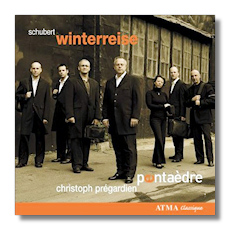
The Internet's Premier Classical Music Source
Related Links
- Schubert Reviews
- Latest Reviews
- More Reviews
-
By Composer
-
Collections
DVD & Blu-ray
Books
Concert Reviews
Articles/Interviews
Software
Audio
Search Amazon
Recommended Links
Site News
 CD Review
CD Review
Franz Schubert

Winterreise
Arranged by Normand Forget
Christoph Prégardien, tenor
Joseph Petric, accordion
Pentaèdre
Atma Classique ACD2-2546 69:32
Schubert's Winterreise (Winter Voyage), a cycle of 24 songs set to texts by Wilhelm Müller, has been recorded many times, so a new recording hardly seems necessary. This new one stands out from the pack for several reasons. First, the songs are presented in Müller's order, which is slightly different than the order in which they usually are performed. (I have no strong opinion about which is better.) More saliently, Schubert's piano accompaniment has been replaced with an arrangement for the French-Canadian wind quintet Pentaèdre (flute/alto flute/piccolo, clarinet/bass clarinet, oboe d'amore, horn/baroque horn, and bassoon) with, of all things, accordion. At first blush, this sounds outrageous. The arrangements by Normand Forget (the ensemble's own oboe d'amore player) are less distracting than one might fear, however, and the accordion blends in nicely. Even if they are emotionally complex, Müller's poems and Schubert's music are formally rather simple, and that simplicity is maintained by Forget's arrangements and by the performances themselves. The cycle's protagonist is probably a country boy, and the cycle's setting is definitely rural. Might one not expect to hear Harmonie and an accordion under such circumstances? Several voice and guitar arrangements of Die schöne Müllerin work well. Finally, the last song in Winterreise is about "Der Leiermann," unusually translated as "The Organ-grinder," and surely it is not a great distance between a barrel organ and an accordion! And why not have a real horn in "Die Post," which mentions a posthorn?
Another innovation included in this recording is a brief accompanying chorale for the four male members of Pentaèdre in "Das Wirtshaus," literally an inn, but here, figuratively a graveyard. The effect is eerie, but is too subtle to be really intrusive.
Tenor Christoph Prégardien recorded Winterreise with fortepianist Andreas Staier about a decade ago. For some listeners, it remains their favorite version, and it is easy to hear why they warmed to it. He really does take the listener on a journey, from the almost indignant hurt of the first song to the resignation of the last. Even the best singers must work hard to prevent Winterreise from becoming monotonous. Monotony is never a danger with Prégardien, who brings so many colors to his voice, and so many shades of emotion to his interpretation. His wanderer is a young man still, and I think that is important in this cycle. He sings all of the songs in Schubert's original keys, and that helps prevent the cycle from being excessively dark. This is not a happy work, and in the latter part it is death-obsessed, but the tragedy is personal, not cosmic, and Prégardien's voice and manner of using it keep this distinction in mind. Pentaèdre and Petric accompany him with smooth, seamless, but not bland perfection – providing you accept the concept behind their accompaniment in the first place!
Recorded in a Québécois church, this Winterreise also boasts a warm, intimate sound – very appropriate for the music.
Copyright © 2008, Ray Tuttle




















